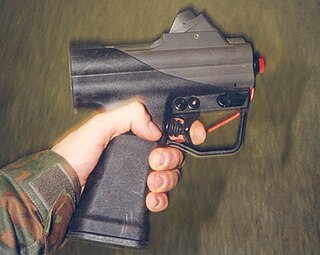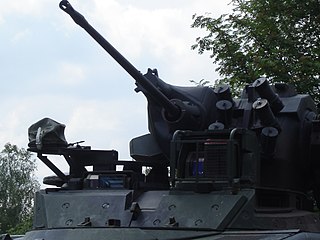 W
WThe AS.34 Kormoran (cormorant) is a German-produced anti-ship missile. The Kormoran uses an inertial guidance system for the midcourse phase, switching to active radar homing during the terminal attack phase. It carries a 165 kg (363 lb) delay-fused warhead, designed for 90mm of penetration prior to detonation. The maximum range is 23 km.
 W
WThe G3 is a 7.62×51mm NATO, select-fire battle rifle developed in the 1950s by the German armament manufacturer Heckler & Koch (H&K) in collaboration with the Spanish state-owned design and development agency CETME.
 W
WThe HK21 is a German 7.62 mm general-purpose machine gun, developed in 1961 by small arms manufacturer Heckler & Koch and based on the G3 battle rifle. The weapon is in use with the armed forces of several Asian, African and Latin American countries. It was also license-manufactured by Fábrica de Braço de Prata in Portugal as the m/968 and in Mexico by SEDENA as the MG21. In the German military (Bundeswehr) and the federal police (Bundespolizei) it is designated "G8".
 W
WThe HK33 is a 5.56mm assault rifle developed in the 1960s by West German armament manufacturer Heckler & Koch GmbH (H&K), primarily for export.
 W
WThe HK69A1 is a 40 mm grenade launcher developed and produced by the German arms manufacturer Heckler & Koch (H&K). The weapon was designed to engage enemy troops and strongpoints out to a distance of 350 m; it can also be used to deploy smoke grenades and illumination flares.
 W
WThe MP5 is a 9x19mm Parabellum submachine gun, developed in the 1960s by a team of engineers from the German small arms manufacturer Heckler & Koch GmbH (H&K) of Oberndorf am Neckar. There are over 100 variants and clones of the MP5, including some semi-automatic versions.
 W
WThe HK P11 is a Heckler & Koch pistol designed as an underwater firearm that was developed in 1976. It has five barrels and each fires a 7.62 X 36mm dart electrically. Loading is by means of a five-round case. The design resembles that of a pepper-box firearm.
 W
WThe BK 27 is a 27 mm (1.063 in) caliber revolver cannon manufactured by Mauser of Germany. It was developed in the late 1960s for the MRCA program that ultimately became the Panavia Tornado.
 W
WMILAN is a Western European anti-tank guided missile. Design of the MILAN started in 1962, it was ready for trials in 1971, and was accepted for service in 1972. It is a wire-guided SACLOS missile, which means the sight of the launch unit has to be aimed at the target to guide the missile. The MILAN can be equipped with a MIRA or MILIS thermal sight to give it night-firing ability.
 W
WThe MG 3 is a German general-purpose machine gun chambered for the 7.62×51mm NATO cartridge. The weapon's design is derived from the World War II era MG 42 universal machine gun that fired the 7.92×57mm Mauser round.
 W
WThe Rheinmetall Mk 20 RH-202 is a 20 mm caliber autocannon designed and produced by Rheinmetall. It fires the 20×139mm ammunition originally developed for the Hispano-Suiza HS.820.
 W
WThe SIG Sauer P220 is a semi-automatic pistol. Designed in 1975 by the SIG Arms AG division of Schweizerische Industrie Gesellschaft, and produced by J. P. Sauer & Sohn, in Eckernförde; it is currently manufactured by both SIG Sauer companies: SIG Sauer GMBH, of Eckernförde, Germany; and SIG Sauer, Inc., of New Hampshire, United States.
 W
WTerne is a Norwegian anti-submarine weapon system, which uses rocket-thrown depth charges. It was developed by the Norwegian Defence Research Establishment (FFI) in cooperation with the U.S. Navy in the late 1940s-early 1960s. The Terne development project consisted of three phases:
 W
WThe Walther MP (Maschinenpistole) series is a family of 9×19mm Parabellum submachine guns produced in West Germany from 1963 to 1985 by Walther.
 W
WThe Walther P5 is a 9mm semi-automatic pistol developed in the mid-1970s by the German small arms manufacturer Carl Walther GmbH Sportwaffen. It was designed with the German police forces in mind, who sought to replace existing 7.65mm pistols with a modern service sidearm incorporating enhanced safety features and chambered in 9×19mm Parabellum. A subsequent bid resulted in the Walther P5 being introduced into service alongside the SIG Sauer P225 and Heckler & Koch P7.
 W
WThe Walther WA 2000 is a semi-automatic bullpup sniper rifle produced by the Carl Walther GmbH Sportwaffen company from 1982 until 1988. It was produced in three different calibers. Production of the rifle was limited and it was shortly stopped because it was too expensive to achieve widespread sales and not robust enough for military use as a sniper rifle. Only 176 were built due to its high cost, making it one of the rarest and most sought production firearms ever made.